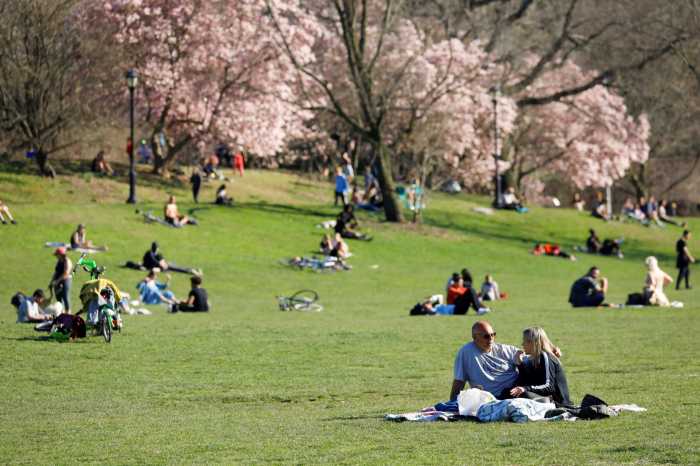If you’re a teacher working for the New York City Department of Education, you won’t be receiving your retroactive payment scheduled for Oct. 15.
It’s news you probably didn’t miss, despite being busy planning for remote and/or in-person lessons, recording asynchronous lessons, getting families i-Pads and internet access because they still don’t have either eight months into this crisis and learning how to use a dozen different apps and platforms to provide access and greater student engagement. Lugging materials to and from school buildings also takes up a lot of time — certainly more than the supposed 35 hours you’re paid to work — nevermind the energy it takes to ignore that the city’s leadership didn’t listen to teachers when we warned that in-building teaching would be dangerous.
We’d warned that school buildings would be shut down, as they now are, until every zip code in the city had less than a 3 percent COVID-19 infection rate. So, if you’ve already spent that money not dreaming that the city would announce this news a week before they were supposed to deliver, you might want to return those luxury goods or groceries or clothes for your children. (However, you will receive half the amount that is owed to you in your Oct. 31 paycheck, with the remaining half being paid out in July 2021.)
Now, not to sound too much like Carrie Bradshaw here, but when I heard that the retroactive payment was canceled (and later divided into two postponed payments following an arbitration hearing), “I couldn’t help but wonder,” would the city have dared to pull something like this with a department that has a male-dominated workforce? I don’t think so.
Sexism has a long history of labor. Whether it’s high skill, low wage, recent, or relatively ancient, there is a long-standing bias against women that devalues their work. The number of teachers within the New York City Department of Education that are female has steadily remained around 75 percent since 2000. Yet, the blatant disrespect and abuse that teachers have experienced — especially during this school year — wouldn’t be happening if the teaching workforce was dominantly male.
Just look at the NYPD, with its predominantly male membership. Their leadership outright disobeys the head of the city they work for without consequence. Do they face cuts and share in the city’s fiscal strife? No, they get an unspecified, and unlikely, reduction in overtime and cosmetic shift. In fact, as this piece was written, that unlikely overtime reduction turned out to be definitively not happening.
At the state level, male-dominated fields fix, build and operate our subways at a rate that is seven times what it costs in the rest of the world. During a fiscal crisis and pandemic, subways are shut down at night while they run, without passengers, their usual route — which means we are paying mostly men money to run trains that are closed to essential workers who now have to find transportation other than what was once, proudly, a 24/7 system.
I’ve heard many female educators say that they are just grateful for their jobs and steady income at the end of the day. This sentiment isn’t wrong, but it is misplaced as a false choice between not having a job or being told to take whatever crumbs those in power decide to dish out. It is true that these are scary times and that anyone who has job protections should be grateful for their good fortune. So many of our fellow New Yorkers have been laid off and had their hours cut as businesses big and small close their doors permanently as a result of the pandemic and inadequate policymakers at all levels of government.
However, members of the United Federation of Teachers have paid dues to ensure certain protections they have. Teachers know they’re not going to get rich in their positions, but that they will (or, at least, should) have the protection of maintaining significant benefits, including healthcare and a strong pension program, as well as knowing that they have the union there to fight for them when negotiating contracts with the city and defending the contract and their rights when need be.
So, no, teachers aren’t just “lucky” to have their jobs protected. They’ve earned and paid for that protection. Teachers are supposed to consider themselves lucky that an independent arbitrator decided they could have the wages they are owed at this time and rest later on?!
New York City’s municipal labor unions’ contracts are staggered not to have all negotiations taking place at once, in hopes of enabling a balance of flexibility and stability as contracts are negotiated — or at least that was the plan until Mayor Mike Bloomberg took the reins, gave himself an additional term, and left every single union contract open and unresolved. City workers went without a contract and therefore without standard raises that barely keep up with inflation. When a contract was finally agreed to with the de Blasio administration, it included retroactive pay, with a schedule for when such payments would be made.
From an early age, boys are taught to be strong and take charge — and they are praised and rewarded when they do. Girls, on the other hand, are called “sassy” or “difficult” for exhibiting the same behaviors; therefore, learning early in life that they should keep their mouths shut and just be grateful for what they get, which partly explains why the gender pay gap continues to exist.
The arbitration ruling and the way it has been spun as a victory is just another example of how women receive less and are supposed to be thankful for it.
The retroactive payment from the city is just that which has been owed for work done many years ago. It’s not a bonus; these are wages already earned. The city has held onto that $900 million, investing it and collecting interest on it for a decade. Now, they will continue to make money off half of the money currently owed for an additional nine months. Teachers are expected to do their part to help the economy get back on its feet, yet their wallets are taking the hit.
Yes, $900 million is a lot of money. No one is debating that. Yes, the city is facing a financial crisis, and the future is unclear. But, to put it into perspective, $900 million is $400 million less than the $1.3 billion the city has paid out to victims of police misconduct since 2014, or about the same as New York City first lady Chirlane McCray’s mental health initiative ThriveNYC cost last year. It’s also less than Amazon CEO Jeff Bezos makes in a single week.
When you consider that less than 25 percent of the New York City Department of Education workforce is male, it’s alarming to think that virtually 100 percent of the people making these decisions are men. The letter announcing the canceled payment was from Deputy Mayor Dean Fuleihan to UFT President Michael Mulgrew, copying Schools Chancellor Richard Carranza — all men.
With so many men making decisions that impact the lives of so many professional women, it’s important to elect more female representation into political offices. The beauty of our political system is that we get to elect who represents us. We can start to make systemic changes by electing more women into office. Some women candidates are running for local office right here in New York City to make excellent leaders in the roles they seek.
Just a few weeks ago, Assemblymember Jo Anne Simon announced her candidacy for Brooklyn borough president and did so, fittingly, in front of Ruth Bader Ginsburg’s alma mater, James Madison High School. I say fittingly because, like RBG, Simon is a lawyer who had to fight for her place at a time when men dominated politics and law in ways ways that they unfortunately sometimes still do. And, like RBG, she’s used her position to advocate for those who need help, especially regarding education and those who’ve had to overcome disabilities.
There are also women on ballots in 19 districts across New York to serve Congress at the state level.
As women, we can stand together to dismantle systems of oppression that result in the acceptance and normalizing of women, and in this instance, teachers, being devalued. The Women’s March is an excellent example of this. This year’s Women’s March — a women-led movement that works to dismantle systems of oppression through nonviolent resistance — will take place on Saturday, Oct. 17.
Suppose marching in Washington isn’t feasible for you. In that case, you could alternatively join the social distance action of marching at one of the many smaller demonstrations happening across the country or by donating to the cause. You can even host your event.
Ultimately, we need a woman in the White House, or — at least, and for the time being — on the grounds of the United States Naval Academy Observatory, Gracie Mansion, or Brooklyn Borough Hall.
Jeannine Mele is a teacher for the New York City public school system.

























